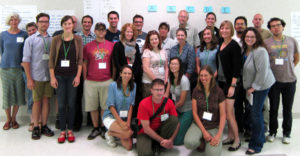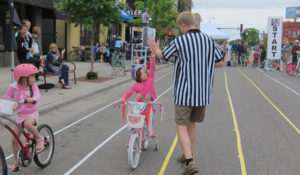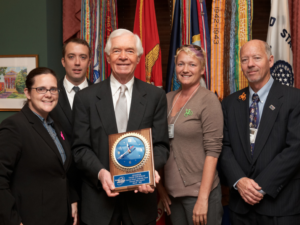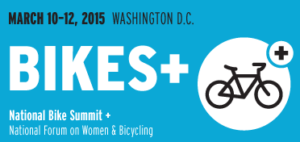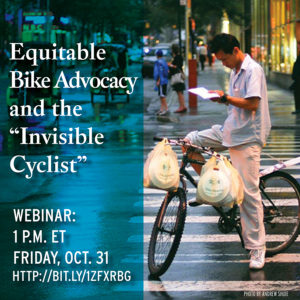Blog
The Advocacy Advance partnership is pleased to announce new support from REI. Through REI’s stewardship and community partnerships, which aims to build and sustain access to inspiring outdoor experiences for the benefits of its members and the broader community, Advocacy Advance received a $25,000 grant to bolster the partnership’s Rapid Response Grants. Advocacy Advance deploys Rapid Response Grants to help advocacy organizations take advantage of unexpected opportunities to access public funds for bicycling and walking investments. These quick turnaround grants range from $1,000 – $3,000 and are awarded on a rolling basis. Since 2011, Rapid Response Grants have funded 35 campaigns in 24 states. Combined, these campaigns have won or preserved over $150 million in public funding, leveraging $1,700 in biking and walking investments for every $1 spent since 2009.
Read More →I met Sarah Johnson a few years ago while living in Omaha, NE. I think we officially met at a fundraising event for a local nonprofit, but I had known of Sarah and her bike advocacy super powers long before that first meeting. After moving to Omaha in 2010, I stopped regularly bike commuting because the roads felt unsafe. There weren’t a lot of good low volume connectors where I needed to go, and I was often intimidated by people in cars who were unused to seeing a woman on bike, just trying to get to work.
Read More →Last month Advocacy Advance held an open call for applications from bicycling and walking advocacy organizations for innovative campaigns to address the most pressing issues in bicycling and walking advocacy investments. Today, we’re excited to announce the three campaigns receiving our “Big Idea” Grants. If successful, these three campaigns will address the urgent need for biking and walking investment at the local level.
Read More →A major lesson learned from this year’s election was that picking the right candidate matters. Republicans had had the chance to win a majority in the both 2010 and 2012 but they didn’t always run the strongest candidates, or their campaigns made missteps along the way.
Read More →Voters flocked to the polls on Tuesday and we saw many changes in State Houses and Congress. But what did November 4th mean for biking and walking? Advocacy Advance tracks and supports campaigns to win public funding for active transportation. Here is an update to highly-anticipated transportation ballot measures that open up funding for local walking and biking projects.
Read More →This guest post comes to us from Chris McCahill, a senior associate with the State Smart Transportation Initiative. Despite gradual improvements, the U.S. is falling behind its peers in terms of traffic safety. Making matters worse, our nation’s most vulnerable road users—pedestrians and cyclists—make up a growing share of traffic fatalities in recent years. In response, the U.S. DOT has made bicycle and pedestrian safety a high priority, state laws are beginning to address the needs of non-motorized road users, and many cities are installing new bike facilities and stepping up traffic enforcement.
Read More →Election Day is here, and we’ve got the breakdown on what’s at stake for bicycling at the ballot box. In the U.S. Senate, a change of party control, which is looking likely, could spell trouble for bicycling at the national level. Here’s why: We could be looking at a May 2015 vote to cut funding for bike projects and removed eligibility for bike and pedestrian facilities from the transportation bill. Senate allies have successfully fought off amendments and legislative maneuvers on this in 2009, 2011 and 2012. If Republicans have more than 55 seats, bicycling priorities will liekly face some opposition, and many of bicycling’s strongest champions in the Senate will no longer be heading up the important committees making the decisions.
Read More →One key question that has arisen from attendees as we enter our fourth year of a day centered on women’s issues in bicycling is whether its appropriate or effective to have this remain a separate event. It is in that spirit that we have chosen to update the name. Rather than be the National Women’s Bicycling Forum, we are now calling this day the National Forum on Women and Bicycling.
Read More →Last Friday, the League hosted a live discussion about the term “invisible cyclist” with Dr. Stephen Zavestoski, of the University of San Francisco; Najah Shakir, of Boston Bikes; Do Lee, of the Biking Public Project; and Erick Huerta, of Multicultural Communities for Mobility.
Read More →Their claim that bicycling has become much more dangerous is based on only data from 2010 to 2012 and is extremely misleading. Using official data from the US Department of Transportation, the total number of bike trips more than tripled from 1,272 million in 1977 to 4,081 million in 2009. During the same period, the number of cyclist fatalities fell from 922 in 1977 to 628 in 2009, a decrease of 32%. Taking into account the increased level of cycling, the cyclist fatality rate fell by a dramatic 79%. In short, cycling has become roughly four times safer per bike trip over the past three decades.
Read More →